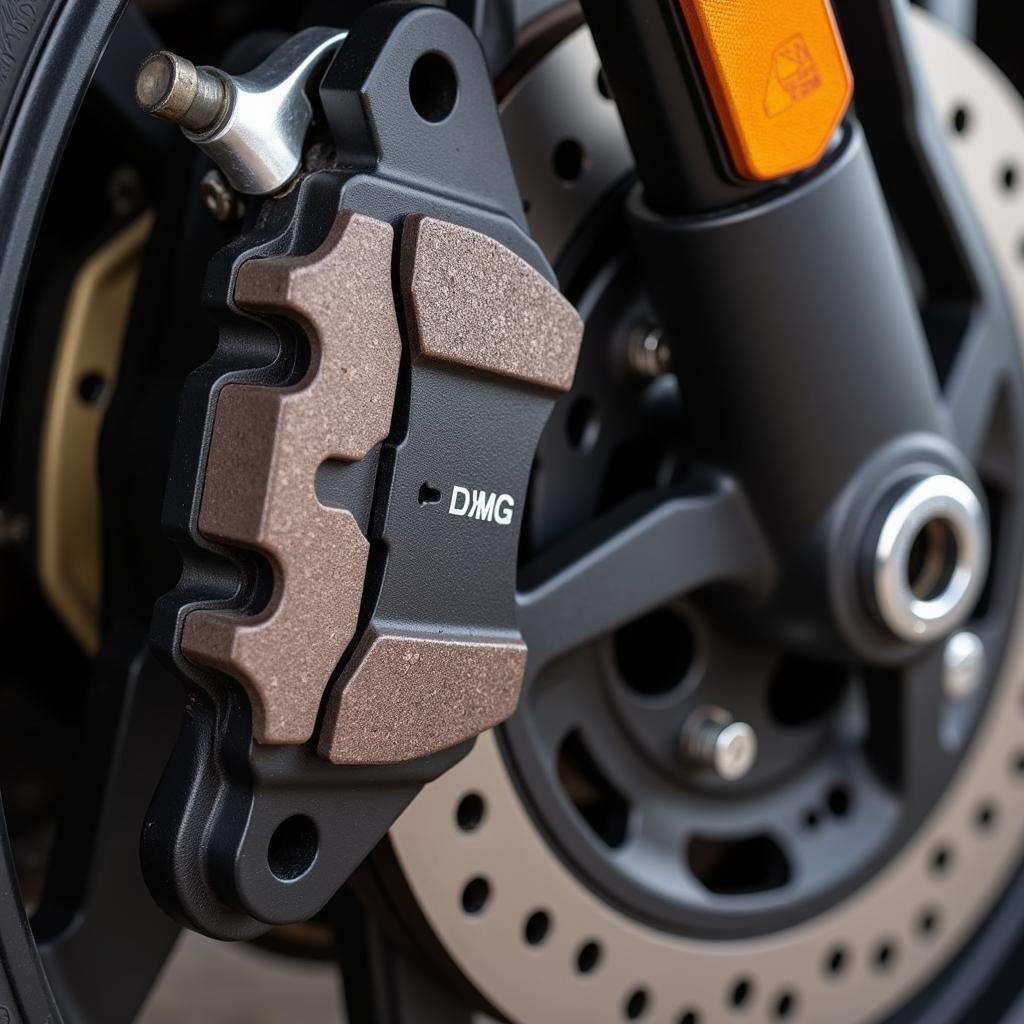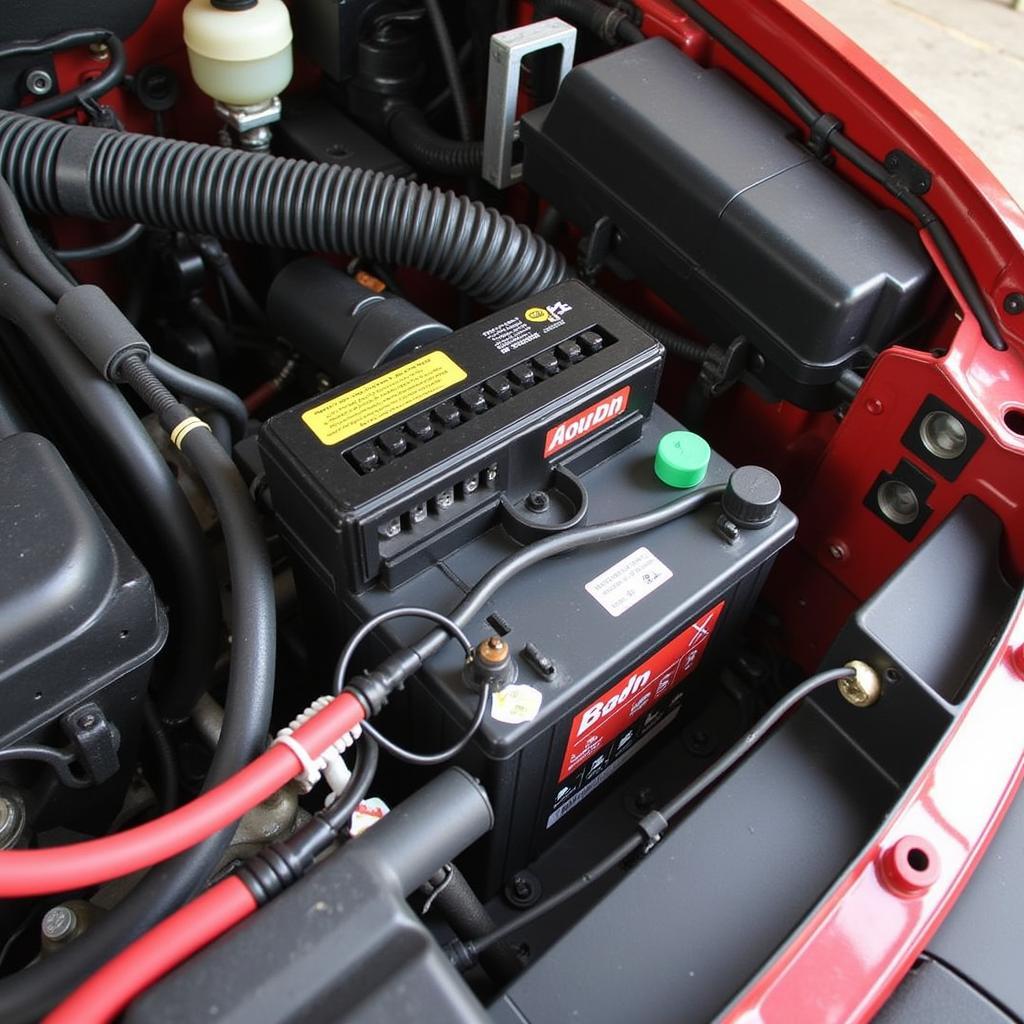A glowing bmw brake light warning light on your dashboard can be unsettling. It signals a potential issue with your BMW’s braking system, demanding immediate attention. This article provides a comprehensive guide to understanding, diagnosing, and resolving the bmw brake light warning light, empowering you to address the problem effectively.
Understanding the various reasons behind this warning light is crucial for accurate troubleshooting. From worn brake pads and low brake fluid to more complex issues like faulty sensors or wiring problems, various factors can trigger the warning. Ignoring this light can lead to compromised braking performance, putting you and other drivers at risk. Let’s delve into the common causes and solutions.
Common Causes of the BMW Brake Light Warning Light
Several factors can illuminate the bmw brake light warning light. Here are some of the most common culprits:
- Worn Brake Pads: Brake pads are designed to wear down over time. When they reach a certain thickness, the wear sensor triggers the warning light, indicating it’s time for replacement.
- Low Brake Fluid: Low brake fluid can be a sign of a leak in the braking system. This is a serious issue that requires immediate attention.
- Faulty Brake Light Switch: The brake light switch activates the brake lights when you press the brake pedal. A malfunctioning switch can cause the warning light to illuminate.
- ABS Sensor Issues: The Anti-lock Braking System (ABS) relies on sensors to monitor wheel speed and prevent wheel lockup during braking. A faulty ABS sensor can also trigger the brake light warning.
- Wiring Problems: Damaged or corroded wiring within the braking system can disrupt communication and activate the warning light.
 Close-up of a worn BMW brake pad with wear indicator
Close-up of a worn BMW brake pad with wear indicator
Troubleshooting the BMW Brake Light Warning Light
Diagnosing the exact cause of the warning light requires a systematic approach. Start with the simplest checks and progress to more complex ones:
- Check Brake Pad Thickness: Visually inspect your brake pads. If they appear thin or you hear a grinding noise when braking, they likely need replacement.
- Check Brake Fluid Level: Locate the brake fluid reservoir and check the fluid level. If it’s low, top it off with the correct brake fluid type. However, persistent low fluid indicates a leak that needs professional attention.
- Inspect Brake Light Operation: Have someone observe the brake lights while you press the brake pedal. If they don’t illuminate, the brake light switch may be faulty.
- Scan for Diagnostic Trouble Codes (DTCs): Using a diagnostic scanner, you can retrieve DTCs related to the braking system. This will pinpoint the specific area of the problem.
“Regular brake system inspections are crucial for preventing unexpected issues and ensuring optimal braking performance,” advises John Miller, a seasoned automotive diagnostician with over 20 years of experience.
Solutions and Repairs
Once you’ve identified the cause, you can proceed with the necessary repairs. Some fixes, like replacing brake pads, can be done by DIY enthusiasts with basic mechanical skills. However, more complex issues, like ABS sensor replacement or brake system leaks, require professional expertise.
- Brake Pad Replacement: Replace worn brake pads with new ones, ensuring they are compatible with your BMW model.
- Brake Fluid Leak Repair: Address any brake fluid leaks promptly. This may involve replacing brake lines, calipers, or other components.
- Brake Light Switch Replacement: A faulty brake light switch is a relatively simple and inexpensive fix.
- ABS Sensor Replacement: Replacing a faulty ABS sensor requires specialized tools and knowledge.
- Wiring Repair: Damaged wiring needs to be repaired or replaced to restore proper communication within the braking system.
“Addressing brake issues promptly not only enhances safety but also prevents more costly repairs down the line,” adds Miller. For example, ignoring a minor brake fluid leak can lead to complete brake failure, a significantly more expensive and dangerous scenario.
Conclusion
The bmw brake light warning light serves as a critical indicator of potential braking system problems. Addressing the issue promptly is crucial for maintaining your BMW’s safety and performance. By understanding the common causes, employing effective troubleshooting techniques, and implementing appropriate solutions, you can ensure your braking system operates optimally, providing you with peace of mind on the road. Don’t hesitate to seek professional help if you encounter complex issues or are unsure about performing the repairs yourself. Remember, a functioning brake system is paramount for your safety and the safety of others.
FAQ
- What does the bmw brake light warning light mean? It indicates a potential issue with your BMW’s braking system, such as worn brake pads, low brake fluid, or a faulty sensor.
- Is it safe to drive with the brake light warning light on? While you might still be able to brake, it’s not safe to drive with the warning light on. The problem could worsen and lead to brake failure.
- Can I reset the bmw brake light warning light myself? You can try resetting the light after addressing the underlying issue. However, if the light persists, further diagnosis is necessary.
- How much does it cost to fix the bmw brake light warning light? The cost varies depending on the specific problem. Simple fixes like brake pad replacement are less expensive than complex repairs like ABS module replacement.
- How often should I check my BMW’s brakes? It’s recommended to have your brakes inspected at least once a year or every 12,000 miles. See our articles on bmw brake warning lights and bmw e90 brake fluid warning light reset for more detailed information.
- Can I use any brake fluid in my BMW? No, use only the brake fluid type specified in your BMW’s owner’s manual. Using the wrong fluid can damage the braking system. For information on older BMW models, see our article on 1987 bmw e30 brake light warning.
- What should I do if my brake pedal feels spongy? A spongy brake pedal often indicates air in the brake lines. This requires bleeding the brakes, a procedure best left to professionals. You might find our articles on bmw brake warning light reset e46 and bmw x3 dsc and brake warning lights fixed helpful for specific models.

